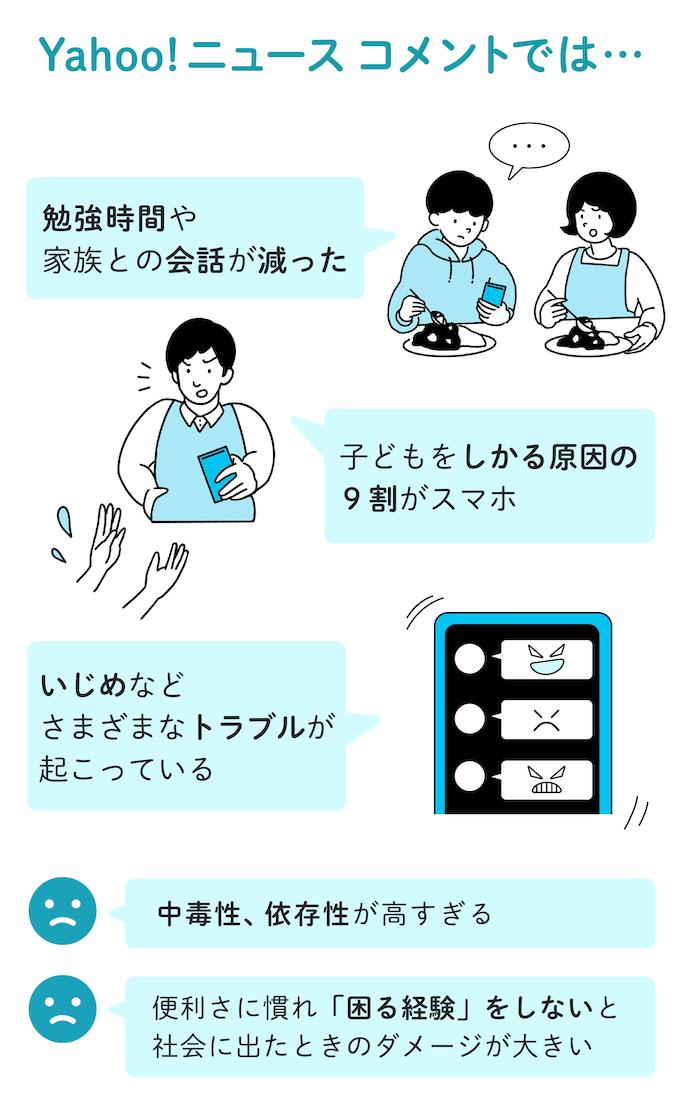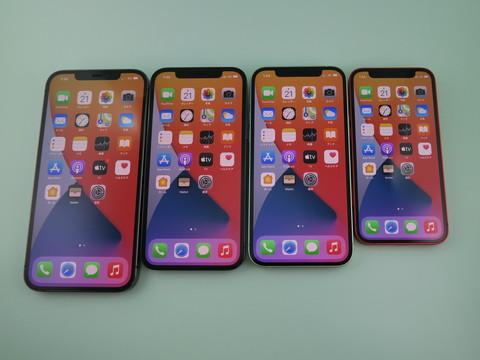"Do children need smartphones?"--Relief and regret, voices of trembling parents Opinions that think the benefits are great Opinions that think the disadvantages are great Other opinions like this... How old do you have to be? "Is it really junior high school students who need attention?" Experts answer everyone's questions about smartphone troubles What can you do at home?
March is considered the biggest sales season in the mobile phone industry, when demand for new lifestyles in the spring overlaps with closing sales. There are probably many parents who plan to give their children smartphones (hereafter referred to as smartphones) when they go on to higher education. Regarding the use of smartphones by children, while communication and convenience are increasing, problems such as "smartphone dependence" and SNS troubles are also increasing. When Yahoo! News asked for opinions on the merits and demerits of smartphones for elementary, junior high and high school students in the comments section, more than 2,700 comments were received. From there, the fluctuating feelings of parents about smartphones, "peace of mind" and "regret", emerged. (Constructed based on comments from February 1 to 8, a total of 2724) (Yahoo! News original feature editorial department / supervision: Seikei University visiting professor / IT journalist Akiko Takahashi)
What stood out were the advantages of safety confirmation and communication. In addition to people who talk about their experiences at the time of the disaster, such as "When the power went out in Hokkaido for a few days, it was useful for gathering information and making emergency calls," "I can't find a public phone as quickly as I used to." We don't live in an era where mothers are always with us," and many people chose to give their children smartphones because of changes in the environment. "When my daughter couldn't go to school due to the coronavirus pandemic, a classmate sent me a picture of what she had written in her notebook," said one of the users who realized the usefulness of the app as a communication tool. In general, there were many opinions that while recognizing the risks of smartphones, they judged that the benefits were greater. "My child taught me how to use a smartphone, and my work improved."
Many of the opinions about the disadvantages were based on actual experiences. "I gave my child a smartphone when I was in high school, but now we have less conversations as a family and less exercise." ”. From the voice of a poster who is a teacher, ``There are really various troubles such as bullying and school refusal caused by smartphones'' and ``There are overwhelmingly many voices of 'regret' from parents at junior high schools. ”, and it seems that it is affecting not only the family but also the educational scene. There were also voices of concern that people would become accustomed to the convenience of smartphones, which allow them to quickly look things up and contact them, and that they would go out into society without having had enough "troublesome experiences." There was also an opinion calling for the creation of rules within a large framework, saying, "It's strange that an item with a considerable degree of dependence is less regulated than other items."
There are opinions that the problem of smartphones is not limited to children, such as "There are many adults who are addicted to smartphones" and "It is rather adults who should acquire literacy so that they can be role models for children." Remarkable. In addition, it is a stage to question the pros and cons of smartphones, such as "It's an era where you can't say 'fast' or 'don't let people carry it' anymore. Rules should be taught in the same way as traffic education." Instead, there are voices that emphasize "how to use". Some commented that they wanted to strengthen the environment for children to use with peace of mind, such as apps for children and enhancement of models according to skill levels. In addition, as options other than smartphones, opinions such as "If it will be useful in the future, it is better to have a computer where you can learn programming etc." and "A smart watch that can grasp location information is sufficient."
According to the Cabinet Office's "Youth Internet Usage Environment Survey Report" (FY2020), the percentage of young people using the Internet who have their own smartphones is 6 to 9 years old. The proportion of households sharing with family members is high. The reversal occurs at the age of 12. In other words, it can be seen that many children start having their own smartphones from the time they graduate from elementary school to the time they enter junior high school. In addition, more than 90% of high school students own one.
We interviewed Akiko Takahashi, a visiting professor at Seikei University and an IT journalist who is familiar with the problem of children and smartphones, about smartphone troubles that you want to be aware of by school age, and summarized the trends.
He writes, lectures, and supervises various media on SNS, Internet use by teenagers, information literacy education, and ICT education. A column is being published in a textbook for junior high school Japanese language published by Kyoiku Shuppan. Over 20 books related to SNS. Former elementary school teacher.
In the lower grades of elementary school, smartphones are often shared with family members, and physical troubles such as breaking or losing smartphones stand out. On the other hand, when girls reach higher grades, they begin to actively use the service, and even though they are not of the target age for the service, there are more behaviors that require attention, such as uploading selfies and videos to SNS. In addition, it is said that the number of consultations about online games, such as high billing charges, is the largest among elementary school students.
Junior high school students are especially prone to trouble. It's time to start having your own smartphone, reach the age of using services, and make your SNS debut. You can't control it when you start using it, and it's easy to fall into "smartphone addiction". It is also a rebellious period when children rebel against their parents, and adolescents develop an interest in sex. The combination of these factors is said to be the reason why there are so many problems.
When you become a high school student, you will be able to limit the time you use your smartphone and use it for learning. On the other hand, parents cannot grasp friendships and private lives, making it difficult for troubles to become apparent. There are also points that need attention, such as getting involved in crimes such as "back part-time jobs" and fraud damages because of the desire for money.

Mr. Takahashi says that troubles unique to the corona crisis are increasing.
From the comments posted, we can see that many people have "questions and worries about children and smartphones." I got the answer from Mr. Takahashi.
Q. When is the right time to give your child a smartphone? A. It depends on the child and environment. If your child wants to have one and needs it for club activities, etc., it is a good idea to discuss it. On the other hand, kids' mobile phones and GPS terminals are also useful for emergency contact. Smartphones tend to have high terminal costs and monthly fees, and once you have them, you can't go back. It is convenient, but there are many temptations, and parents need to manage and watch over it. If you give your child a smartphone, it is a good idea to discuss it with your child when they first start using it and decide on rules and rules before using it.
Q. What should parents do to develop literacy? A. Many of today's parents are of the generation who have not received information literacy education. For that reason, I think there are many people who say, "I don't have confidence or don't really understand" when it comes to smartphones, but there is no need to be condescending. Many damages can be prevented with experience, knowledge, common sense, and judgment unique to adults. However, it is necessary to set up an antenna for the damage and troubles that are happening now. Being interested in the news on a regular basis and being aware of incidents related to smartphones and the Internet will help improve your literacy. At that time, it is recommended to share the news with parents and children as it will also educate children's literacy.
Q. Regarding children's smartphone use, isn't it necessary to take measures not only at home but also at schools, countries, and mobile carriers? A. The government enforces and amends the "Youth Internet Environment Improvement Law". In addition to making it mandatory to provide filtering services for smartphones used by children under the age of 18, we are also focusing on educational activities. The intention is to increase the literacy of children while increasing the safety of smartphone use. Mobile carriers are asking parents to apply filtering when signing contracts with minors, and companies such as LINE are conducting many smartphone safety classes.
Saving troubled parents? Let's use "parental control"
What should we do at home so that children can use smartphones appropriately? Takahashi says, ``Most of the worries parents have about smartphones can be addressed with parental controls.''
Parental control refers to general measures for parents to appropriately manage their children's smartphone use. Specifically, it refers to using the parental control function of smartphones and apps to manage the rules after discussing them at home. The parental control function includes managing and limiting usage time, such as "you can use up to XX hours per day" and "suspension of use between XX and XX hours", content filtering and identification to prevent viewing of harmful sites. This includes restrictions on the use and installation of apps, and restrictions on payments and billing.
The setting method for the parental control function differs depending on the smartphone OS (iOS, Android, etc.) and the contracted mobile carrier. There are probably many people who are not good at such settings. Takahashi cites the following as "minimum things parents should do."
(reference site) ■Functions and setting methods provided by each mobile carrier (external site), NTT docomo, au, Softbank
■ Functions provided by each OS and how to set them (external site) ・iOS "Screen Time" function ・Android "Digital Wellbeing" function
Determining rules for how to use smartphones is also an important means of parental control. In the comment section of Yahoo! News, various voices were received regarding the rules that are being implemented in each household. Here is an example.
What to keep in mind when raising children in the era of smartphones
Click here for the article on which the article was created. [Let's think about it together] What do you think is the greater advantage or disadvantage of having smartphones for elementary, junior high and high school students?






![[July 6 and 7] DX realized by content cloud, advanced platform for business transformation](https://website-google-hk.oss-cn-hongkong.aliyuncs.com/drawing/article_results_9/2022/3/9/6bbafe438d78271513761788166cbf94_0.jpeg)

